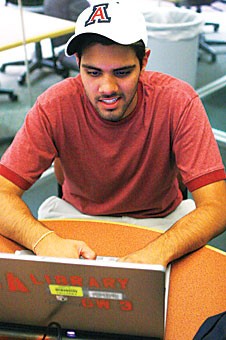Longer library hours, more laptops and easier access to journal articles in the library database are a few of the changes at the UA Main Library as a result of the new student technology fee.
The library received $7.50 of the $32.50-per-semester fee, resulting in $400,000 going to the library for new services.
The library is expanding the Laptop Loan program with an additional 36 computers, in collaboration with the Tubbs Foundation.
David Baca, communications and marketing director for the library, believes that additional computers available for loan will be beneficial to those students who frequently find themselves waiting for a computer.
“”The original 14 computers purchased by the Tubbs Foundation are in constant use,”” said Baca. “”Every computer is in use about a third of the time the library is open, and this is actually quite high use considering that the average laptop is used three to four hours at a time.””
Joe Kimbro, a molecular and cellular biology senior, said he spends a lot of his time studying in the library, but he was unaware of the Laptop Loan program.
“”Computers are always in high demand in the library,”” said Kimbro. “”I think that the service has good intentions, but it seems as if even with these additional computers, there still is a very small number available to loan to students.””
The Main Library and Science-Engineering Library will also stay open additional hours during the winter break, spring break and the summer.
Baca said since students remain on campus during winter, spring and summer pre-session, the expansion of hours was made in direct response to those students’ requests.
It is too early to determine how many students will utilize the new library hours because the only opportunity to collect data was the summer week prior to this semester, said Baca.
“”We did see a slight increase in traffic that one week, especially towards the end when more students were back on campus,”” said Baca.
Longer hours during spring break or summer pre-session are convenient because there are always students trying to get work done during these periods, said Julia Cochran, a family studies and human development junior.
Another change is that articles and book chapters from the library print collections will be scanned and delivered to student desktops for free upon request.
There will still be a fee for delivery of books and other circulating material to on- and off-campus locations.
Baca foresees this service as being one of the most popular among students in the long run.
“”We expect that graduate students and faculty will make the most use of the service, at least at first, but after about six months, we will see significant increases in usage,”” said Baca. “”Once the campus is more familiar with the service, we expect undergraduates to start making use of it as well.””
Christian Ozorio, a psychology freshman, said that easier access to library journals will immediately benefit students.
“”Now that library journals will be sent directly to my desktop, they will be there as long as I want,”” said Ozorio. “”This is a lot more convenient for myself and others who live off campus.””









